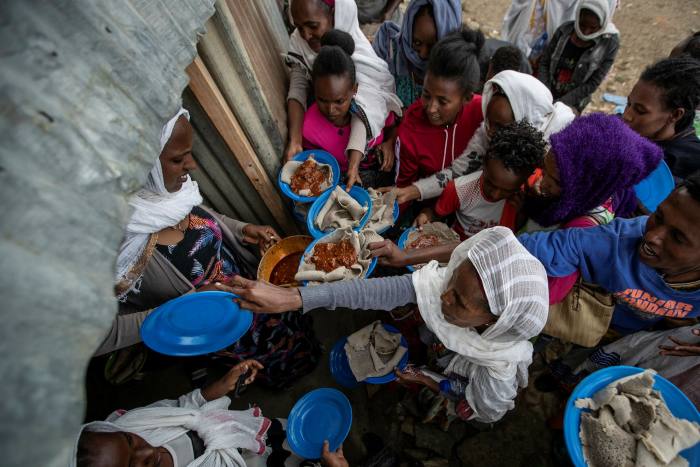The last time Berhanu Nega ran for office, in 2005, he performed so well that he ended up in jail. The then ruling Ethiopian People’s Revolutionary Democratic Front, rattled by a strong opposition showing, declared a state of emergency, fabricated the results and threw Berhanu, who had been elected mayor of Addis Ababa, into prison.
Now 62, Berhanu is a leading opposition candidate in Monday’s parliamentary election, billed as Ethiopia’s first truly “free and fair” poll.
The vote will be prime minister and Nobel Peace Prize winner Abiy Ahmed’s first electoral test since sweeping to power on the back of protests in 2018 promising reform.
Even as some opposition politicians say the process is deeply flawed, Abiy hopes it will rescue a reputation badly damaged by the recent civil war, brewing famine and atrocities in the northern Tigray region.
“What is at stake is the very existence of this country,” said Berhanu, an economics professor once designated a terrorist and sentenced to death in absentia during years in exile, referring to the ethnic violence that has erupted not just in Tigray but across the country since Abiy took office.
That violence, between several of Ethiopia’s 80 ethnic groups, has displaced 2m people, not including in Tigray, and threatens to rip apart an ancient nation of 114m people whose ethnic cleavages are often compared to the former Yugoslavia.

Berhanu, who shares with Abiy a view of Ethiopia as a more unified state, argues that the election could act as a reset, soothing tensions that he attributes partly to the election itself. “I care less about who wins and much more about the process,” he said. “If we can conduct a credible election, I think this could be a new beginning for this country.”
That view is not shared by other opposition parties, who regard the poll as deeply compromised and one that Abiy’s recently formed Prosperity party cannot lose.
Several prominent would-be challengers are in prison and many parties are boycotting an exercise that will not take place in some parts of the country, including Tigray, because they are deemed too unstable. Of 547 parliamentary seats, at least 102, mainly from three regions — Tigray, Somali and Harari — will not be contested, according to Chatham House, a think-tank.
“This will be an election like the ones during the days of Joseph Stalin, when he told the people of Russia ‘you vote, we count’,” said Merera Gudina, chair of the Oromo Federalist Congress, which is boycotting the poll. As a result, Abiy’s party is expected to sweep Oromia, the biggest region with 35m people, in spite of the fact that the prime minister, an Oromo himself, is regarded by many there as having sold out his region’s interests to a vision of a more centralised state.
Opposition parties, including Berhanu’s Ethiopian Citizens for Social Justice, claim posters have been ripped down and supporters roughed up, although Berhanu said he did not expect any outright rigging, such as ballot stuffing. Unlike the last election in 2015, where the EPRDF “won” 100 per cent of parliamentary seats, he predicted opposition parties would gain significant representation.

Still, the election is scrappy, “full of illegal restraints, intimidation, arrests, violence of all kinds”, according to Belete Molla, chair of the National Movement of Amhara party, an ethnic nationalist group. “The Prosperity party has been massively spending government money for party campaigning, coercing people using government aid programmes,” Belete said, referring to alleged withdrawal of subsidised goods such as fertiliser for those not registered to vote.
About 37m people have registered after a slow start that necessitated a second minor postponement after a contentious decision not to run the election in 2020 because of Covid-19.
Daniel Bekele, head of the state-appointed Ethiopian Human Rights Commission, said that, despite the difficulties, the election was more open than those held under 27 years of EPRDF rule. “It’s a reasonably credible electoral process which is a step towards a better election in future,” he said. “But the overall political environment creates a challenge for a fully free and fair election.”
A few days before Monday’s poll, Abiy returned to his birthplace in the city of Jimma in Oromia for a rally designed to demonstrate his enduring popularity. There, it was hard to find anyone who did not support him or who did not endorse the war against a Tigray People’s Liberation Front blamed for decades of repression when it led the EPRDF coalition. Abiy’s supporters argued he was left with no option but to invade Tigray after troops loyal to the TPLF attacked the federal army’s northern command in November.
“The problem is the TPLF government, which was very bad,” said Nuritu Siraj, a 39-year-old housewife, whose eyes glazed over each time she mentioned “our Abiy”. Dressed in a hijab emblazoned with the Prosperity party’s lightbulb emblem, she said of the violence in Tigray, in which massacres, rape and looting have been common: “This is not a war, this is a peacekeeping operation.”
As tens of thousands of supporters gathered, some of them on horseback, Abiy plugged his unity vision, still unpopular in parts of the country where ethnic groups such as Somalis, Afars and his own Oromo people jealously guard their autonomy. “Our unity does not destroy our diversity, our diversity does not disperse our unity,” he said.
Even the prime minister appears to be reining in expectations about the coming poll. “This will be the nation’s first attempt at free and fair elections,” he said in a less-than-definitive endorsement.
However smoothly that attempt goes, many of Ethiopia’s swirling problems — most pressing of all the raging war in Tigray — remain intractable. “This is a critical time; we are at a critical crossroad,” said Merera.

